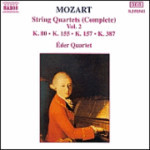
String Quartets Vol 2: String Quartets Nos. 1, 2, 4 and 14
 $25.00
Out of Stock
$25.00
Out of Stock6+ weeks add to cart
W.A. MOZART
String Quartets Vol 2: String Quartets Nos. 1, 2, 4 and 14
Eder Quartet
[ Naxos / CD ]
Release Date: Friday 25 February 2005
This item is currently out of stock. It may take 6 or more weeks to obtain from when you place your order as this is a specialist product.
"These are open-hearted, likeable performances."
- Gramophone
Wolfgang Amadeus Mozart was born in Salzburg in 1756, the son of a court musician who, in the year of his youngest child's birth, published an influential book on violin-playing. Leopold Mozart rose to occupy the position of Vice-Kapellmeister to the Archbishop of Salzburg, but sacrificed his own creative career to that of his son, in whom he detected early signs of precocious genius. With the indulgence of his patron, he was able to undertake extended concert tours of Europe in which his son and his elder daughter Nannerl were able to astonish audiences. The boy played both the keyboard and the violin and could improvise and soon write down his own compositions.
Childhood that had brought Mozart signal success was followed by a less satisfactory period of adolescence largely in Salzburg, under the patronage of a new and less sympathetic Archbishop. Like his father, Mozart found opportunities far too limited at home, while chances of travel were now restricted. In 1777, when leave of absence was not granted, he gave up employment in Salzburg to seek a future elsewhere, but neither Mannheim nor Paris, both musical centres of some importance, had anything for him. His Mannheim connections, however, brought a commission for an opera in Munich in 1781, but after its successful staging he was summoned by his patron to Vienna. There his dissatisfaction with his position resulted in a quarrel with the Archbishop and dismissal from his service.
The last ten years of Mozart's life were spent in Vienna in precarious independence of both patron and immediate paternal advice, a situation aggravated by an imprudent marriage. Initial success in the opera-house and as a performer was followed, as the decade went on, by increasing financial difficulties. By the time of his death in December 1791, however, his fortunes seemed about to change for the better, with the success of the German opera The Magic Flute, and the possibility of increased patronage.
Tracks:
String Quartet No. 1 in G major, K. 80
I. Adagio 06:20
II. Allegro 03:15
III. Menuetto 03:24
IV. Rondeau: Allegro 02:37
String Quartet No. 2 in D major, K. 155
I. Allegro 03:49
II. Andante 04:19
III. Molto allegro 01:36
String Quartet No. 4 in C major, K. 157
I. Allegro 05:44
II. Andante 05:24
III. Presto 02:01
String Quartet No. 14 in G major, K. 387
I. Allegro vivace assai 08:02
II. Menuetto: Allegro (Allegretto) 08:54
III. Andante cantabile 07:45
IV. Molto allegro 05:33
